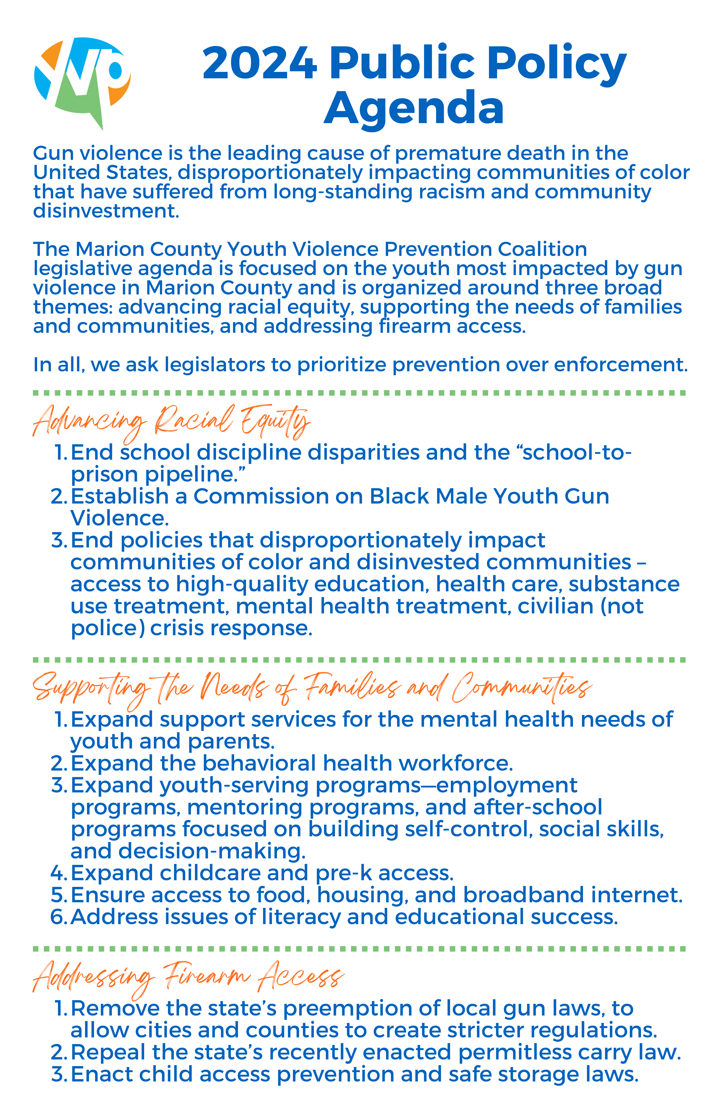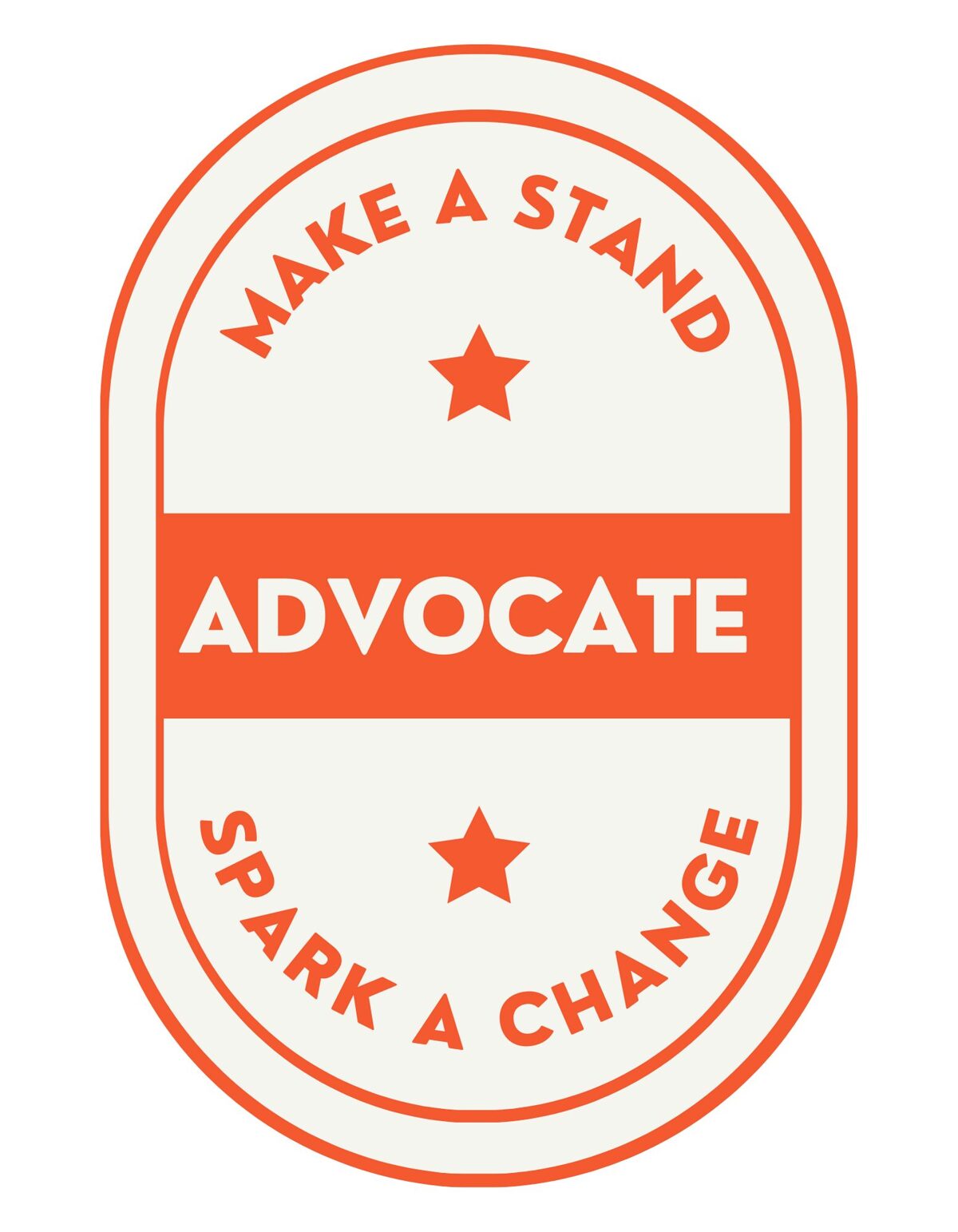
Policy & Advocacy
Advocate for Gun Safety Policies

You can advocate for gun violence prevention measures at different levels of government.
At the national level, Indianapolis has two elected officials who represent all of Indiana in the U.S. Senate, and two districts in the U.S. House of Representatives. Marion County comprises the entire 7th Congressional District and a portion of the 6th Congressional District. Not sure who your Representative is? Click here to find out.
Our state legislature has two branches, which together form the General Assembly: the upper house, which is the State Senate, and the lower house, which is the House of Representatives. The General Assembly creates new laws for the state, approves the state budget, and more. To find your legislator and their contact details, click HERE.
The 25-member City-County Council proposes, debates, and passes legislation that governs the City of Indianapolis. It works to pass programs and bills that address property and housing, public safety, green space preservation, and more. Some local policies, like many gun laws, are preempted by state legislation and are therefore out of the jurisdiction of the
City-County Council. To learn who your district Councillor is, click HERE.
Senator Todd Young
251 North Illinois Street, Suite 120
Indianapolis, IN 46204
Phone: (317) 226-6700
Email: https://www.young.senate.gov/contact/email-todd
Twitter: @SenToddYoung
Facebook: @SenatorToddYoung
Senator Mike Braun
115 N. Pennsylvania Street
Indianapolis, IN 46204
Phone: (317) 822-8240
Email: https://www.braun.senate.gov/contact-mike
Twitter: @SenatorBraun
Facebook: @SenatorBraun
7th District | Representative Andre Carson
300 E Fall Creek Pkwy. N. Dr., Suite 300
Indianapolis, IN 46205
Phone: (317) 283-6516
Email: andre.carson07@mail.house.gov
Twitter: @RepAndreCarson
Facebook: @CongressmanAndreCarson
6th District | Representative Greg Pence
18 E. Main Street, Suite 210
Greenfield, IN 46140
Phone: (812) 799-5233
Email: https://pence.house.gov/contact
Twitter: @RepGregPence
Facebook: @RepGregPence
Advocacy Toolkits

Explore the American Academy of Pediatrics' (AAP) longstanding advocacy efforts and discover the policies they champion for a safer future for children, families, and communities.
https://www.aap.org/en/advocacy/gun-violence-prevention-advocacy-toolkit/

Stop Handgun Violence is a Massachusetts-based non-profit organization that works to reduce firearm injuries and deaths through education, public awareness, common sense gun laws, and strategic partnerships. This tool kit is intended to be a road map for students and anyone interested in getting actively involved in helping reduce firearm injuries and deaths in your home state.

Various Policies and Programs that Address Firearms
Preemption law:
In constitutional law, preemption underscores the legal precedence of higher levels of government. In the United States, federal law supersedes state legislation in cases of conflict, and state law takes precedence over city or local law. Regarding firearms, a typical preemption law asserts that the state legislature has exclusive authority over firearms regulation, rendering municipal ordinances, such as assault weapons bans or mandatory reporting of stolen guns, ineffective. Indiana's gun preemption law specifically bars local governments, including Indianapolis, from regulating firearms, ammunition, or firearm accessories.
Under current federal law, only federally licensed firearms dealers must request a firearm background check before a gun can be transferred. Private gun sellers, like those at gun shows or online, are not required to request a background check. If the background check takes longer than three business days to complete, the seller is permitted to complete the transfer even if the background check is not complete. (This is known as the Charleston Loophole.) Safe storage and child access prevention:
Safe storage laws limit accessibility to guns by unauthorized users, including minors, through practices like requiring that guns be locked in a secure place. Child access prevention laws impose liability on adults who allow children to have unsupervised access to guns.
The Department of Justice published model safe storage legislation to help states craft appropriate requirements for securing firearms kept in residences and vehicles and to ensure that those firearms do not fall into the hands of children, teens, and prohibited persons. Concealed carry and open carry:
The state has substantially weakened the restrictions regarding the concealed and open carry of firearms in public spaces in recent years, expanding the number of users who are authorized to carry loaded handguns in public as well as the number of public locations in which individuals can carry firearms. Stand Your Ground laws:
These laws allow a person to use deadly force in public, even if they know they could safely avoid any need for violence by simply stepping away from the incident. Waiting periods:
A waiting period law requires a certain number of days to pass between the purchase of a firearm and when the buyer can actually take possession of that gun. By delaying immediate access to firearms, they can help prevent impulsive acts of gun violence, including gun homicides and suicides. Ghost guns:
These are self-assembled firearms that can be built from kits or created with 3D printers. Ghost guns do not have a serial number, making them untraceable by law enforcement, and they often lack a metal component, making them undetectable by metal detectors. Domestic violence firearm prohibitions:
Gun safety laws can prevent firearms from being used as tools of intimidation, coercion, and abuse by keeping people from accessing guns after they have been convicted of domestic violence crimes or while they are subject to active court orders against domestic violence. Extreme risk protection orders (ERPOs):
Extreme risk laws allow families, household members, or certain key community members to petition a court to temporarily restrict a person’s access to guns if they pose a significant risk of harming themselves or others. This vital tool saves lives by allowing the people who are most likely to notice when someone poses a risk with a firearm to take concrete steps to disarm them. Community violence intervention work:
Limiting access to guns is an important component of any strategy to save lives, but it’s equally important to invest in the evidencebased—and remarkably effective—community-driven programs that disrupt cycles of violence and support people in crisis. These can include group violence intervention, relationship-based street outreach, and hospital-based violence intervention.
For more information on these policies and others, visit Giffords Law Center’s gun law hub.